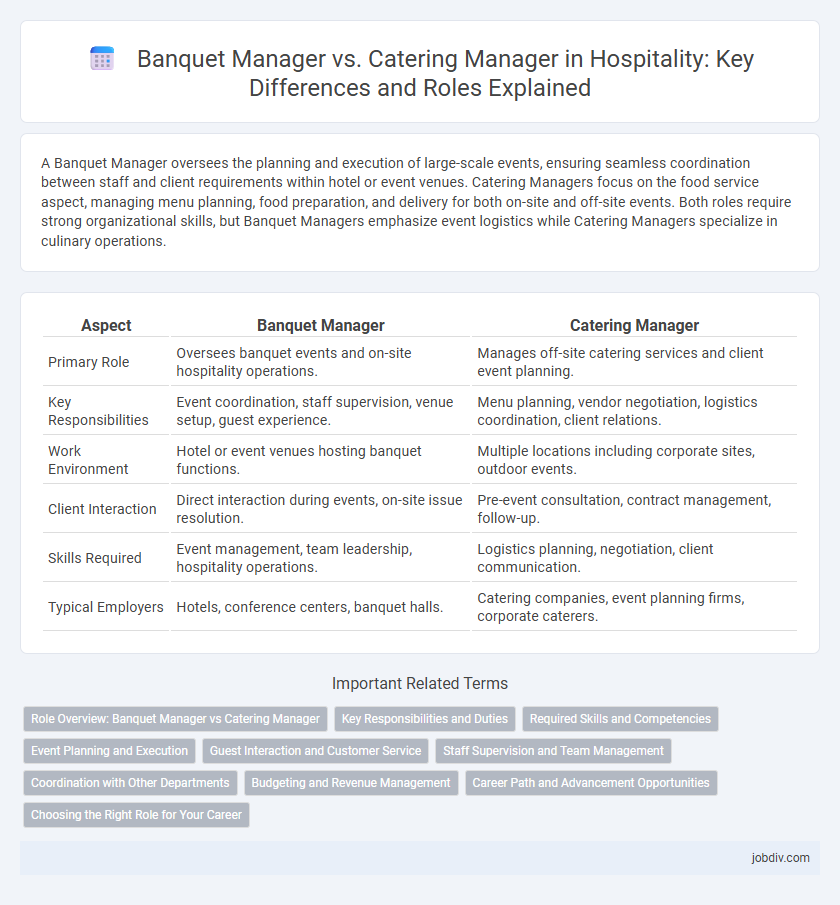A Banquet Manager oversees the planning and execution of large-scale events, ensuring seamless coordination between staff and client requirements within hotel or event venues. Catering Managers focus on the food service aspect, managing menu planning, food preparation, and delivery for both on-site and off-site events. Both roles require strong organizational skills, but Banquet Managers emphasize event logistics while Catering Managers specialize in culinary operations.
Table of Comparison
| Aspect | Banquet Manager | Catering Manager |
|---|---|---|
| Primary Role | Oversees banquet events and on-site hospitality operations. | Manages off-site catering services and client event planning. |
| Key Responsibilities | Event coordination, staff supervision, venue setup, guest experience. | Menu planning, vendor negotiation, logistics coordination, client relations. |
| Work Environment | Hotel or event venues hosting banquet functions. | Multiple locations including corporate sites, outdoor events. |
| Client Interaction | Direct interaction during events, on-site issue resolution. | Pre-event consultation, contract management, follow-up. |
| Skills Required | Event management, team leadership, hospitality operations. | Logistics planning, negotiation, client communication. |
| Typical Employers | Hotels, conference centers, banquet halls. | Catering companies, event planning firms, corporate caterers. |
Role Overview: Banquet Manager vs Catering Manager
Banquet Managers oversee on-site event operations, managing banquet staff, coordinating setup, and ensuring seamless service during weddings, conferences, and formal dinners. Catering Managers handle off-site food preparation, menu planning, client consultations, and logistics for delivering catering services to diverse venues. Both roles require strong organizational skills, but Banquet Managers focus more on in-house event execution, while Catering Managers prioritize external event coordination and client relationship management.
Key Responsibilities and Duties
A Banquet Manager oversees the coordination and execution of large-scale events, focusing on venue setup, staff management, and ensuring seamless service during banquets and receptions. Catering Managers handle menu planning, food preparation logistics, client consultations, and vendor coordination to deliver customized catering services. Both roles require strong organizational skills and customer service expertise but differ in scope, with Banquet Managers concentrating on event operations and Catering Managers emphasizing culinary and menu-specific management.
Required Skills and Competencies
Banquet Managers require strong organizational skills and expertise in event coordination, ensuring seamless execution of large-scale gatherings with attention to detail and client satisfaction. Catering Managers must excel in menu planning, food safety regulations, and vendor negotiations, focusing on customized culinary experiences and logistical efficiency. Both roles demand excellent communication abilities, leadership in managing teams, and problem-solving skills to adapt to dynamic hospitality environments.
Event Planning and Execution
Banquet Managers oversee on-site event planning and execution, ensuring seamless coordination of venue setup, staffing, and real-time guest services during banquets. Catering Managers focus on menu planning, food preparation, and delivery logistics, tailoring culinary services to client specifications for events held both on and off-site. Effective collaboration between Banquet and Catering Managers optimizes event success through integrated management of hospitality, timing, and customer satisfaction.
Guest Interaction and Customer Service
Banquet Managers focus on on-site guest interaction during events, ensuring seamless service and immediate resolution of issues to enhance the guest experience. Catering Managers prioritize pre-event customer service by collaborating with clients on menu planning, logistics, and customization to meet specific guest needs. Both roles require strong communication skills, but Banquet Managers excel in real-time service management while Catering Managers specialize in detailed planning and client coordination.
Staff Supervision and Team Management
Banquet Managers specialize in overseeing event staff during large-scale functions, coordinating servers, bartenders, and setup crews to ensure seamless service and timely execution. Catering Managers focus on managing kitchen teams and delivery personnel, emphasizing food preparation quality and logistical coordination for off-site events. Both roles require strong leadership skills, but Banquet Managers prioritize in-venue staff supervision while Catering Managers handle team management across multiple locations.
Coordination with Other Departments
A Banquet Manager coordinates closely with event planning, culinary, and service staff to ensure seamless execution of on-site events, focusing on space setup and guest experience during functions. A Catering Manager collaborates primarily with sales, logistics, and kitchen teams to manage off-site food preparation and delivery, emphasizing timely service and menu customization. Effective communication between these roles and departments streamlines operations, enhances client satisfaction, and optimizes resource allocation in hospitality management.
Budgeting and Revenue Management
Banquet Managers primarily focus on on-site event coordination and managing banquet operations to maximize venue utilization, while Catering Managers emphasize pre-event planning, client negotiations, and menu costing to control food and labor expenses. Effective budgeting in banquet management involves optimizing room setup and staffing to enhance revenue per event, whereas catering management centers on precise forecasting of ingredient costs and pricing strategies to ensure profitability. Both roles require detailed revenue management skills, but Catering Managers typically analyze sales trends and client preferences to drive repeat business and increase overall catering income.
Career Path and Advancement Opportunities
Banquet Managers typically advance by gaining comprehensive event coordination skills and moving into senior event director roles, focusing on on-site event execution in hotels or conference centers. Catering Managers often climb the career ladder by enhancing client relationship management and operational efficiency, progressing toward catering director or hospitality management positions. Both roles offer distinct career paths shaped by expertise in event logistics or client services, influencing long-term advancement in the hospitality industry.
Choosing the Right Role for Your Career
Banquet Managers oversee on-site event execution, ensuring seamless coordination between staff, clients, and vendors for weddings, corporate events, and large gatherings. Catering Managers focus on menu planning, food preparation, and delivery logistics, often managing off-site events and maintaining vendor relationships. Choosing the right role depends on your strengths in event logistics and client interaction versus foodservice management and operational oversight within the hospitality industry.
Banquet Manager vs Catering Manager Infographic

 jobdiv.com
jobdiv.com